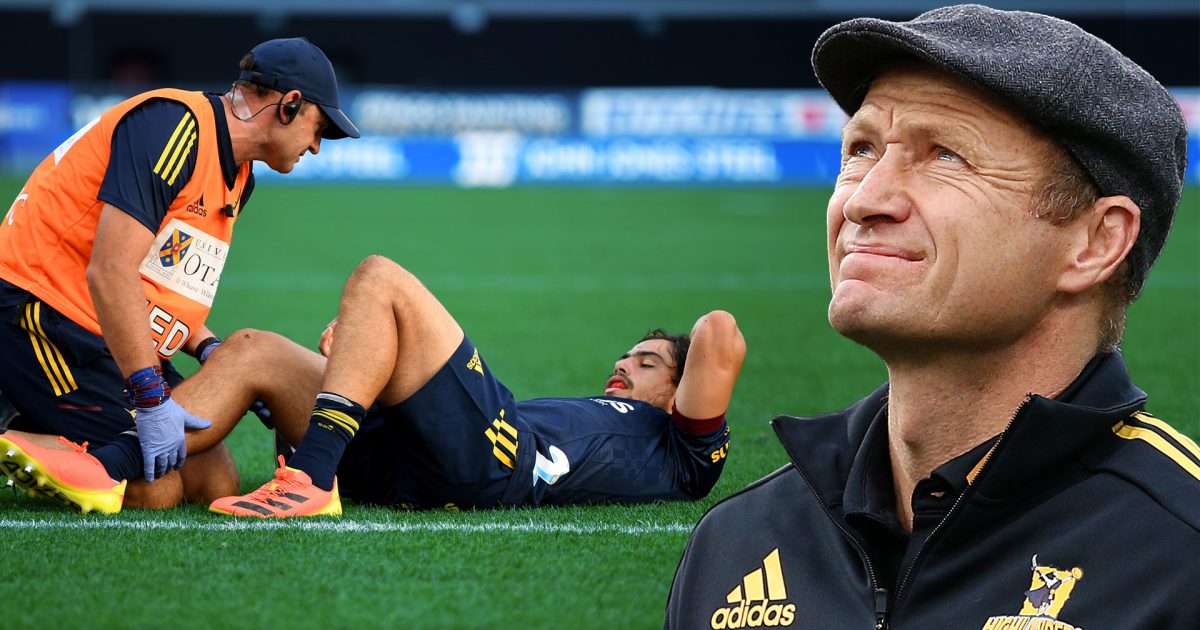Tony Brown's bench tactics must come under question after Highlanders' loss

For the first 15 minutes of the Highlanders’ clash with the Crusaders in Dunedin on Friday night, the home side looked on track to set a record-winning margin over their southern rivals for the second year on the trot.
The Highlanders forwards were churning through the metres and the defending bodies on attack, Aaron Smith was delivering slick service to the backs and men such as midfielder Fetuli Paea and outside backs Sam Gilbert and Josh Timu looked that much more dangerous and incisive than they had the week prior against the Chiefs in Queenstown.
Up 13-0 with less than a quarter of the game played and all the momentum in their favour, the Highlanders looked poised to kick on and lay down a marker in the early rounds of Super Rugby Pacific.
Then disaster struck.
In the same passage of play, Timu sustained an injury to his right leg while Crusaders winger Sevu Reece managed to fight his way over the try-line from a five-metre penalty.
Reece’s score halted the Highlanders’ march but even from the next kick-off, it was clear that the fight hadn’t left the home team.
The more pressing issue was Timu’s injury, which left him limping around the park, but didn’t immediately force him from the field.
Moments later, the Crusaders exploited Timu’s obvious discomfort, with Will Jordan popping a kick over the top of the Highlander’s head for Reece to run on to.
The man who’d scored the Crusaders’ opening try just moments earlier collected the ball – with Timu not able to turn and chase with any real conviction – and sent a kick into the Highlanders 22, where Mitch Hunt collected the ball and kicked the ball out under pressure, handing the Crusaders a prime attacking opportunity.
Highlanders coach Tony Brown had seen enough and understandably hooked Timu from the field.
In most situations, losing an outside back so early in the match wouldn’t be a death knell to any team’s fortunes, but Brown had rolled the dice with his team selections and named just two backs in the reserves, halfback Folau Fakatava and pivot Marty Banks.
Banks entered the fray in Timu’s place and from that point on, the Highlanders never really looked the same on attack.
For all of Banks’ years of experience and nous – this is the man who kicked a drop goal to cement the Highlanders their first and only Super Rugby title back in 2015, remember – the 32-year-old could hardly be called a dynamic ball-running option and quickly slotted in at fullback, and Connor Garden-Bachop, one of the best attackers in the Highlanders’ arsenal, switching onto the wing.
One injury had effectively forced a complete reshuffle of the Highlanders backline and while Brown had indicated they were going for a more conservative mindset against the Crusaders than they had the week before, with Mosese Dawai and Scott Gregory both dropping out of the 23, they appeared to have lost all their attacking nous once Timu left the park.
Thomas Umaga-Jensen and Garden-Bachop – two men who returned to the starting line-up for the first time after long stints on the sidelines and two of the Highlanders’ more potent attacking options – were rarely given the ball with room to move in the second half while Hunt, perched at the back, simply didn’t have the gas to ignite his side’s counter-attack.
“We’ve always sort of favoured the 6-2 split previously,” Brown said of his forwards-backs split ahead of the game.
“We just feel as though our loose forwards are a big strength of ours. We feel that both Hugh [Renton] and Marino [Mikaele-Tu’u] can give us a massive impact off the bench so looking forward to getting them out there and seeing what they can do.”
Unfortunately, Timu’s early injury meant the Highlanders never got to make the most of their extra loose forward on the bench. Hugh Renton remained on the sidelines until the final five minutes of the match, presumably in the event that another injury occurred, which would have forced the Highlanders to play with just 14 men.
Brown’s justification for wanting an extra loose forward in the reserves is sound enough but it’s a policy that can leave your team hamstrung if one of your backs is struck down by injury early – which is hardly an unfathomable event in this day and age of attritional rugby and exactly what happened on Friday night.
Dawai and Gregory may not have covered themselves in glory against the Chiefs but they certainly didn’t go from being good enough to start a Super Rugby match to not being worthy of even a spot on the bench, and the selection tactic employed by Brown was badly found out against the Crusaders.
The best-case scenario would have seen the Highlanders introduce some fresh legs to their loose forwards later in the piece, which is a small upside, while the worst-case scenario is considerably more impactful and potentially cost the Highlanders the match.
As Brown alluded to, it’s a tactic the Highlanders have employed regularly in the past, with an additional loose forward being named on the bench in every match bar two last year, and evidently Brown has seen enough in those games to determine it’s the right way forward.
Curiously, it’s not a tactic any of the other New Zealand Super Rugby sides have ever employed, despite some of them arguably boasting stronger depth in the loose forwards than the southerners.
Tony Brown is one of the most tactically astute coaches in New Zealand and it would be wrong to suggest outright that there isn’t any merit to doubling up loose forwards on the bench.
However, after Friday night’s defeat, Brown may want to rethink the tactic lest another similar situation unfurls in the future.




























